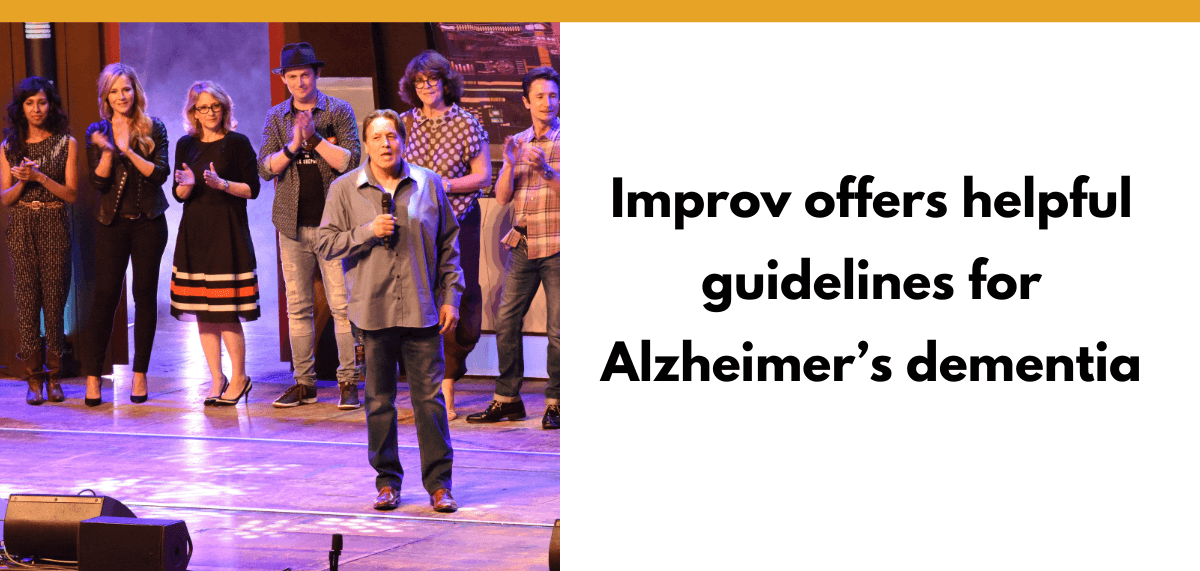Have you ever talked with an adult who’s confused about the year or insists they have to go to work–even though they’ve been retired for years? Maybe you tried steer the conversation back to reality, only to find that your good intentions left them upset, angry, or anxious? If so, you’re not alone. It turns out that improv theater offers communication strategies that can work well with people who have Alzheimer’s dementia.
Free DIRECT download: Alzheimer’s: Use improv strategies to communicate (patient handout). (Email subscribers get free access to all the resources in the Free Subscription Library.)
Outline:
- Trying to orient a confused person to reality.
- Why use improv strategies for Alzheimer’s dementia?
- Meet Karen, improv actor and AD care partner.
- Improv guidelines for Alzheimer’s dementia.
- Karen’s tips for specific situations.
- Related Eat, Speak, & Think posts.
- References.
Trying to orient a confused person to reality
Sometimes, people with Alzheimer’s dementia want to re-learn important facts. If that’s so, we could use spaced retrieval with errorless learning to help them. But often, our well-meaning attempt to orient a confused person to reality doesn’t work very well.
People with Alzheimer’s dementia experience gradual changes in how their brains process memory, language, and orientation to time and place. Not only do they begin to forget recent events, their brains may also produce vivid and detailed false memories which feel completely real. (Guzmán-Vélez et al., 2014)
So when we try to correct someone with Alzheimer’s, we’re threatening their reality.
Imagine you’re living on a memory care unit and you know that people are depending on you to show up to work today. So there you are, trying to find a way out, and a staff member tells you that you retired years ago and let’s go paint a picture. Would you feel confused, angry, or anxious? I would!
That staff member wasn’t trying to upset you. They were trying to orient you to reality so that you could join in with the group activity rather than be stressed about going to a job you no longer had.
This is a completely normal response, so don’t feel bad if you’ve pulled out photo albums, retirement certificates, or news clippings to try to orient someone who’s confused.
But let’s go back to our “going to work” example. The disagreement you had with the staff member probably didn’t feel good. You probably didn’t believe you were retired, and now you’re probably not feeling good about that staff member. Even if you did accept that you were retired, you’ll probably forget that fact quickly.
Research shows that positive and negative emotions can persist for up to a half an hour after a person with Alzheimer’s forgets the cause. (That’s the longest time period that was tested, so the emotions may last longer.) (Guzmán-Vélez et al., 2014)
This is why attempts to orient people to reality can backfire, leading to increasing negative emotions and disruptive behaviors over the course of the day.
So if you know someone who is confused about the current time, place, or situation and you’ve experienced challenges with communication, read on to learn how improv can help us communicate better with people living with Alzheimer’s dementia.
Why use improv strategies for Alzheimer’s dementia?
Improvisational theater involves two or more actors create a story in real time, in front of an audience. Successful improv requires:
- Accepting and agreeing with what others say.
- Being fully present.
- Embracing uncertainty.
- Working as a team.
- Using imagination and play.
When I asked ChatGPT how it would describe improv theater in relation to communication in Alzheimer’s dementia, this is what it said:
“It’s not about being funny (though it often is); it’s about being open, curious, and responsive–qualities that translate beautifully into dementia care and communication.”
-(OpenAI, 2025)
If you’re familiar with improv and know someone who is confused as a result of Alzheimer’s, you can probably already see how improv tactics could help with communication.
Meet Karen, improv actor and AD care partner
Karen Stobbe was already an accomplished improv actor when her father was diagnosed with Alzheimer’s dementia (AD), and then her mother was diagnosed with mixed dementia (vascular and Alzheimer’s). In caring for her parents, Karen realized that the guidelines for improv can be very helpful for communicating with someone who is confused as a result of Alzheimer’s.
Karen is the founder of Being In The Moment, a non-profit dedicated to provide free training for families, friends, and care partners of people who are living with dementia. There are wonderful resources on this site, including this video on how to respond to someone wanting to go home, to a place that is no longer theirs.
You can watch Karen’s TEDMED talk with her husband, Mondy Carter, to see specific examples of how to apply the improv guidelines!
Improv guidelines for Alzheimer’s dementia
Karen uses the word “guidelines” because every person is different, just as every improv skit is different. So we can’t memorize exactly what to say in any given situation, because there are too many variables.
But we can learn the guidelines of improv and try to use them when we communicate with someone who has Alzheimer’s. Here are the guidelines from Karen and Mondy’s TEDMED talk:
- Say: “Yes, and–.”
- Agree, don’t deny.
- Accept offers and gifts.
- Be specific.
- Listen fully.
- Accept the reality given to you.
- Go with the flow.
- Share focus. Give and take.
- Silence can be powerful.
- Commit 100%.
- Be in the moment.
Karen’s tips for specific situations
Karen, Mondy, and the Being in The Moment team offer a lot of free resources on their site. Here are just a few videos that touch on common issues:
- Sundowning or…
- Looking for his wife or Where is my sister? (who passed away).
- Singing the same thing over and over.
- My mom embarrasses me.
- Going with the flow (when your loved one says something that’s not true).
- Peeing in odd places.
- Packing a bag and I want to go home.
Related Eat, Speak, & Think posts
- Communicate better in Lewy body dementia.
- 5 stories share how to live the best life with dementia.
- Massive resource list for Alzheimer’s disease and 17 related conditions.
References
- Guzmán-Vélez, E., Feinstein, J. S., & Tranel, D. (2014). Feelings without memory in Alzheimer disease. Cognitive and behavioral neurology : official journal of the Society for Behavioral and Cognitive Neurology, 27(3), 117–129. https://pmc.ncbi.nlm.nih.gov/articles/PMC4175156/
- OpenAI. (2025). ChatGPT (May 3 version) [Large language model]. https://chat.openai.com/chat. [Quoted above]
- Stobbe, K., & Carter, M. (2014). Using improv to improve life with Alzheimer’s [Video]. TEDMED. https://www.youtube.com/watch?v=GciWItvLo_s
Free DIRECT download: Alzheimer’s: Use improv strategies to communicate (patient handout). (Email subscribers get free access to all the resources in the Free Subscription Library.)
Disclosure: Some ideas and language were shaped with the support of ChatGPT, a large language model developed by OpenAI, as part of the drafting and editing process. All final content reflects Lisa’s own synthesis, clinical judgment, and voice.
Featured image by weldert from pixabay, found on Canva.com.
Lisa earned her M.A. in Speech-Language Pathology from the University of Maryland, College Park and her M.A. in Linguistics from the University of California, San Diego.
She participated in research studies with the National Institute on Deafness and other Communication Disorders (NIDCD) and the University of Maryland in the areas of aphasia, Parkinson’s Disease, epilepsy, and fluency disorders.
Lisa has been working as a medical speech-language pathologist since 2008. She has a strong passion for evidence-based assessment and therapy, having earned five ASHA Awards for Professional Participation in Continuing Education.
She launched EatSpeakThink.com in June 2018 to help other clinicians be more successful working in home health, as well as to provide strategies and resources to people living with problems eating, speaking, or thinking.



Be First to Comment